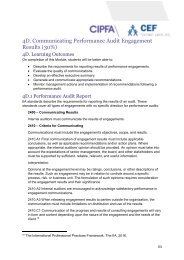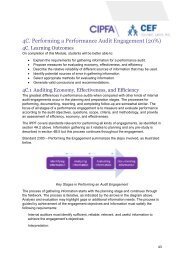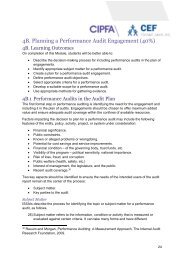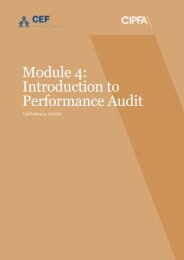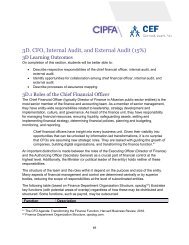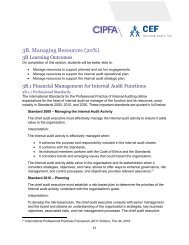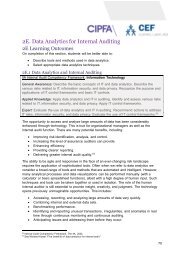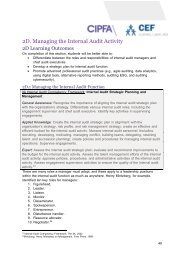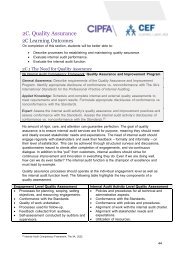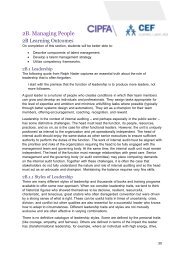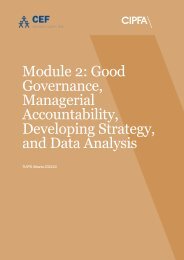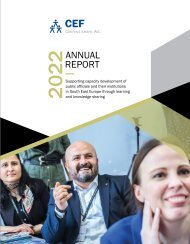TIAPS Module 1 Audit and Assurance workbook
Create successful ePaper yourself
Turn your PDF publications into a flip-book with our unique Google optimized e-Paper software.
According to The IIA Position Paper: The Internal <strong>Audit</strong> Charter, the document should<br />
contain the following:<br />
• Internal audit mission <strong>and</strong> purpose.<br />
• Reference to or inclusion of the m<strong>and</strong>atory elements of the IPPF by which the<br />
internal audit function will be governed. (Recognizing the m<strong>and</strong>atory elements of the<br />
IPPF in the charter is a requirement of St<strong>and</strong>ard 1010 – Recognizing M<strong>and</strong>atory<br />
Guidance in the Internal <strong>Audit</strong> Charter.)<br />
• Authority, clarifying the functional <strong>and</strong> administrative reporting relationships <strong>and</strong> the<br />
role of the governing body in upholding the authority of the internal audit function.<br />
• Independence <strong>and</strong> objectivity, ensuring the head of internal audit will safeguard the<br />
independence of the function <strong>and</strong> the objectivity of auditors, applying safeguards<br />
when required, <strong>and</strong> reporting threats <strong>and</strong> limits to independence <strong>and</strong> objectivity to<br />
the governing when they arise.<br />
• Scope to confirm the internal audit’s responsibility for providing assurance <strong>and</strong><br />
advice on the adequacy <strong>and</strong> effectiveness of governance, risk management, <strong>and</strong><br />
internal control.<br />
• Responsibilities of the head of internal audit.<br />
• Requirements for a quality assurance <strong>and</strong> improvement program, including an<br />
external quality review at least once every five years. 30<br />
Without sufficient authority, the internal audit function is unable to fulfil its m<strong>and</strong>ate. Its work<br />
may be obstructed by managers who are not interested or who would prefer to avoid scrutiny<br />
for whatever reason. Internal audit may also be constrained by limited resources or by being<br />
denied access to information it needs to complete its work. There is a close link between<br />
authority <strong>and</strong> independence. The pronouncements of the internal audit function are more<br />
likely to be considered authoritative if it operates independently but it is only able to do that if<br />
it has sufficient force behind it, whether by legislation or the endorsement of the governing<br />
body (ideally both).<br />
According to the IIA, to ensure the internal audit function has sufficient authority, the<br />
governing body (or audit committee) is expected to:<br />
• Approve the internal audit charter.<br />
• Approve the internal audit plan.<br />
• Approve the internal audit budget <strong>and</strong> resource plan.<br />
• Receive timely communications on performance relative to the internal audit plan.<br />
• Approve the appointment <strong>and</strong> removal of the head of internal audit (typically in<br />
response to discussions with <strong>and</strong> recommendations from senior management).<br />
• Approve the remuneration of the head of internal audit (typically in response to<br />
discussions with <strong>and</strong> recommendations from senior management).<br />
• Make appropriate inquiries of management <strong>and</strong> the head of internal audit to<br />
determine if there are any inappropriate scope or resource limitations.<br />
• Ensure the head of internal audit has unrestricted access to, <strong>and</strong> can communicate<br />
<strong>and</strong> interact directly with, the governing body without management present.<br />
30<br />
IIA Position Paper: The Internal <strong>Audit</strong> Charter, The Institute of Internal <strong>Audit</strong>ors, 2019<br />
33





